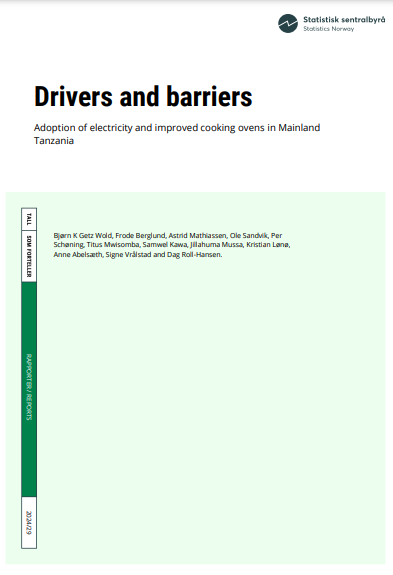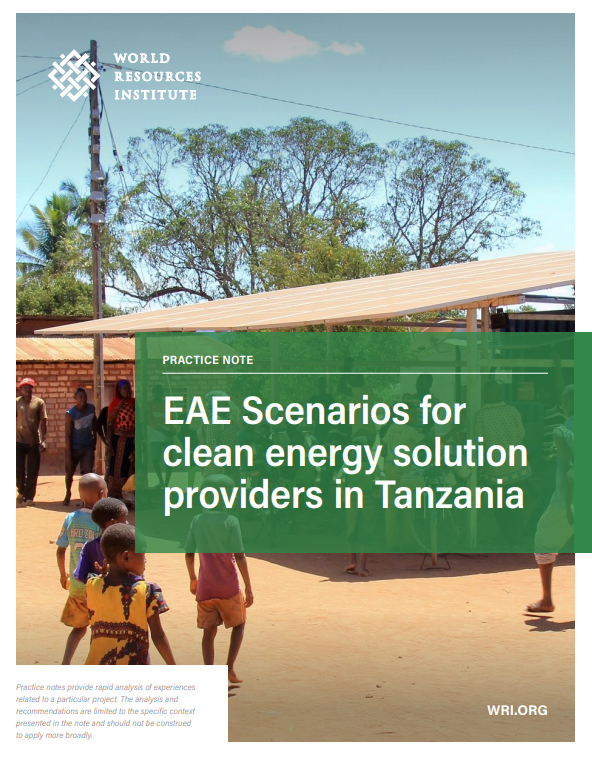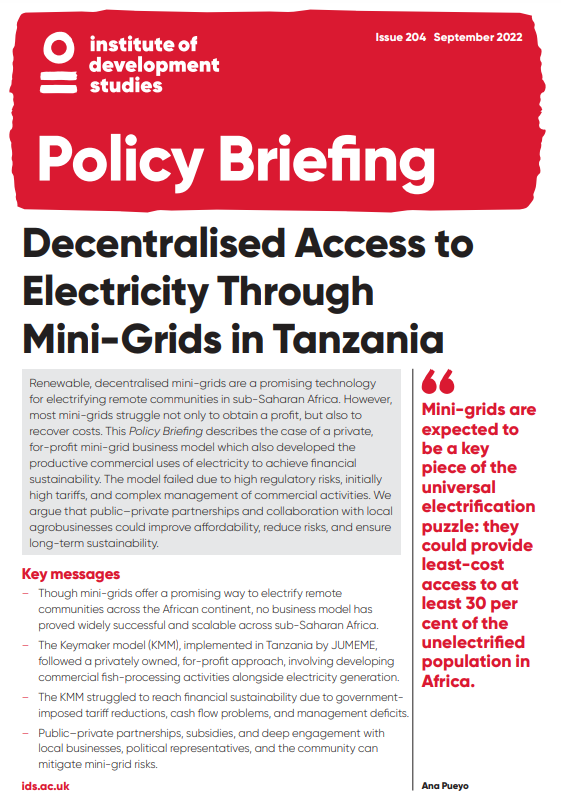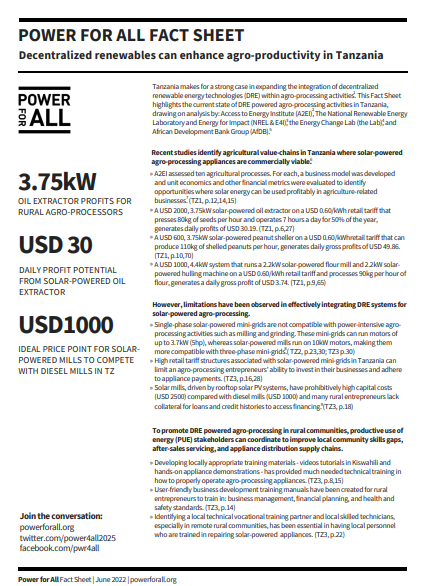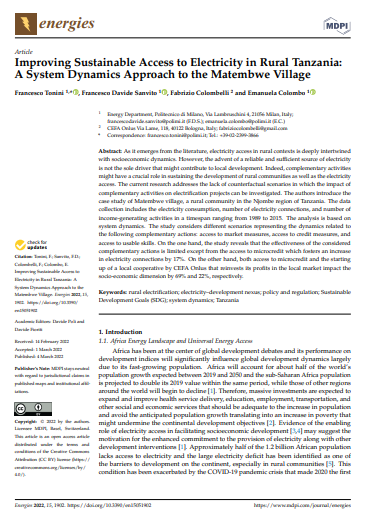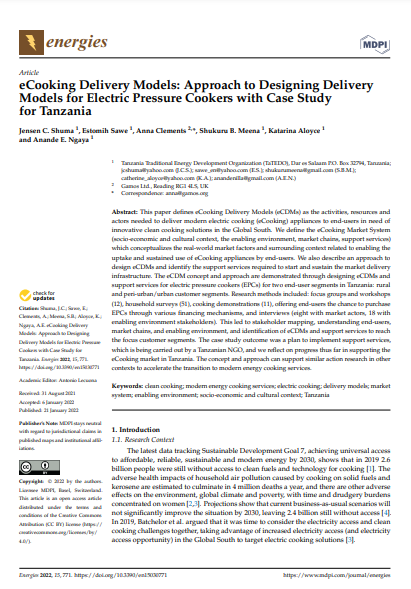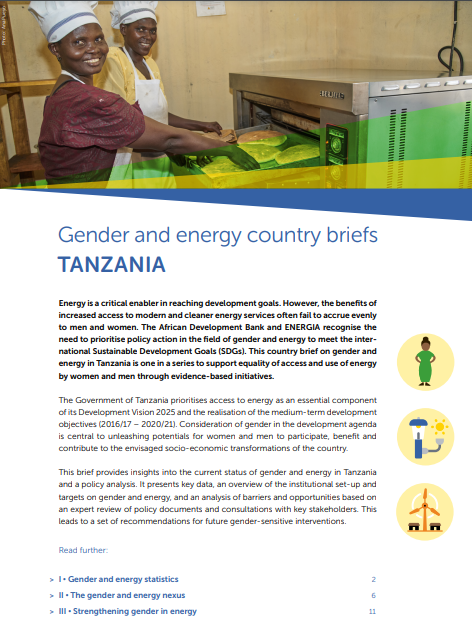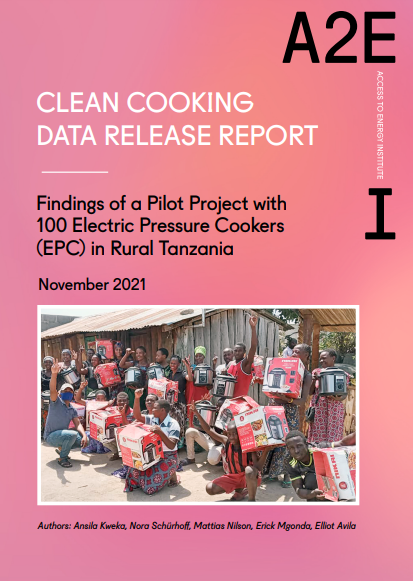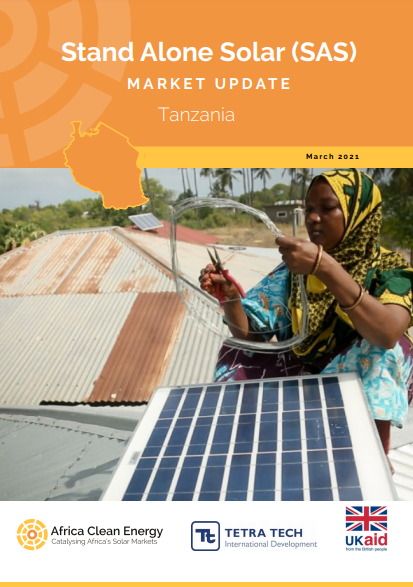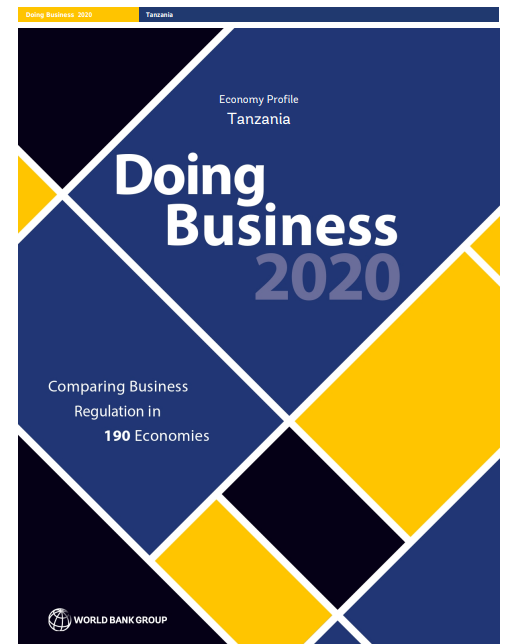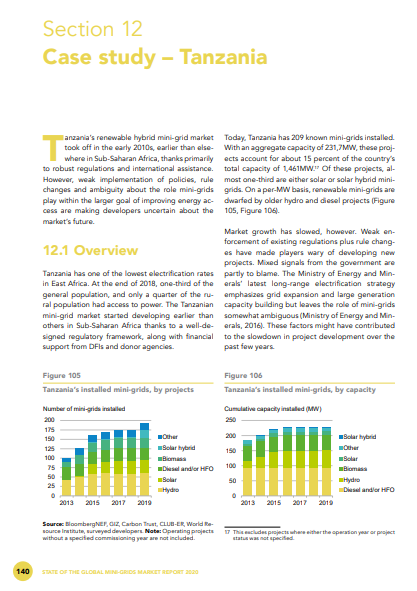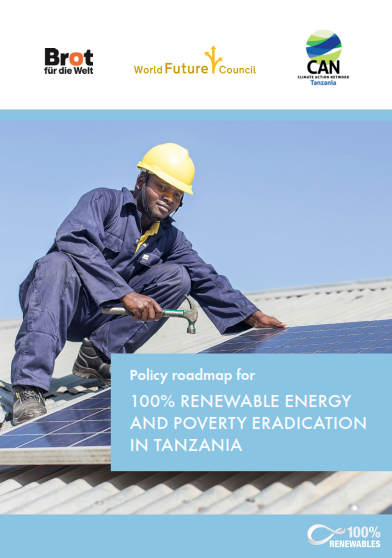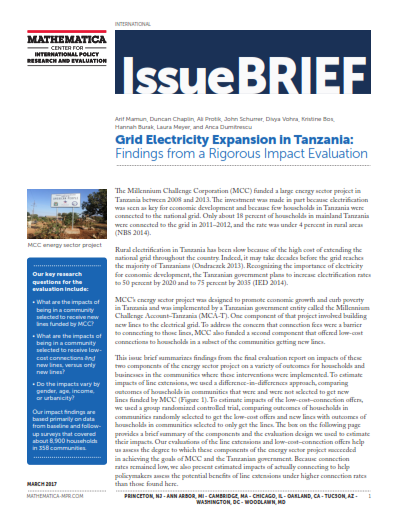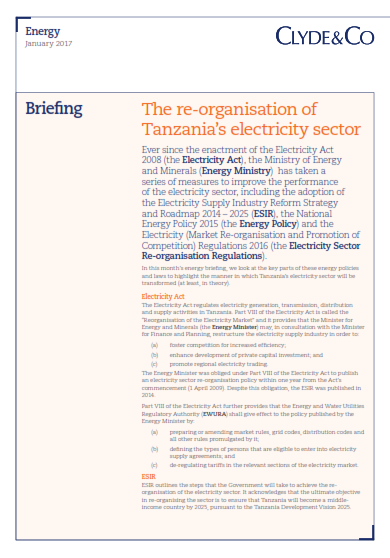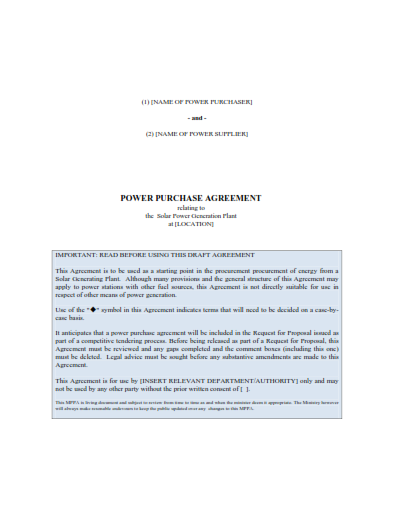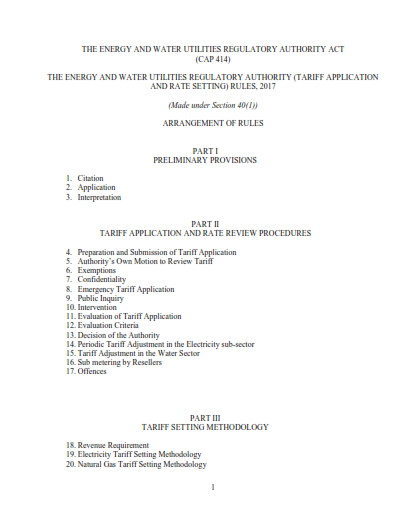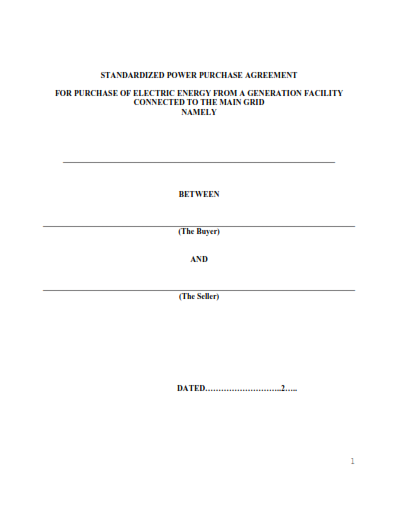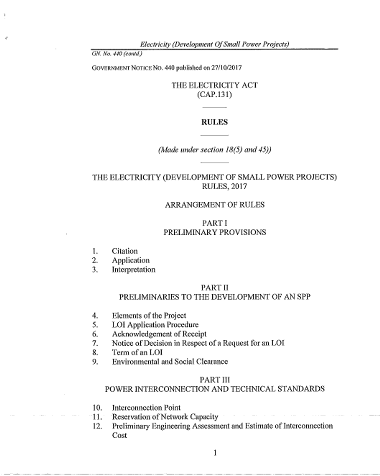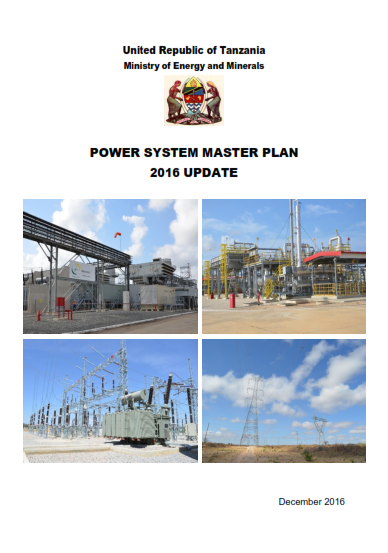We post here the relevant reports for the power sector in Tanzania. Feel free to join our efforts and share us any other you may have found. We'd be glad to add them to the list. Just send an email to This email address is being protected from spambots. You need JavaScript enabled to view it.
Publication date: 17 September 2024
Author: Statistics Norway
Description: This report focuses on the latter two. There are two main supply lines for electricity, connection to a grid or to a solar device with battery. TANESCO is the government agency running the electricity grid net. But in rural areas, the government agency REA will build the grid. When the REA network is extended to a community, connection to the house is free of charge and households only pay for internal wiring.
Download Report >>
Visit Website >>
Publication date: 31 May 2024
Author: WRI
Description: This publication offers clean energy solution providers in Tanzania an updated geospatial database for operating mini-grids through Energy Access Explorer (EAE), a “Digital Public Good” software. The database is a collaboration between local actors in the private and public sectors following agreed data standards.
The publication also demonstrates the potential use of EAE in developing market expansion geospatial analysis. Showing how geospatial data can assist in expanding businesses and introducing targeted investment towards developing resilient communities.
Download Report >>
Visit Website >>
Publication date: 24 September 2022
Author: Institute of Development Studies (ISD)
Description: Renewable, decentralised mini-grids are a promising technology for electrifying remote communities in sub-Saharan Africa. However, most mini-grids struggle not only to obtain a profit, but also to recover costs. This Policy Briefing describes the case of a private, for-profit mini-grid business model which also developed the productive commercial uses of electricity to achieve financial sustainability.
Download Report >>
Visit Website >>
Publication date: 23 June 2022
Author: Power for All
Description: Decentralized Renewable Energy (DRE) sources can enhance agro-productivity and food security. This Fact Sheet highlights the current state of DRE powered agro-processing activities in Tanzania, drawing on analysis by: Access to Energy Institute (A2EI), The National Renewable Energy Laboratory and Energy for Impact (NREL&E4I), the Energy Change Lab (the Lab), and African Development Bank Group (AfDB).
Download Report >>
Visit Website >>
Publication date: 4 March 2022
Author: MDPI
Description: As it emerges from the literature, electricity access in rural contexts is deeply intertwined with socioeconomic dynamics. However, the advent of a reliable and sufficient source of electricity is not the sole driver that might contribute to local development. Indeed, complementary activities might have a crucial role in sustaining the development of rural communities as well as the electricity access. The current research addresses the lack of counterfactual scenarios in which the impact of complementary activities on electrification projects can be investigated.
Download Report >>
Visit Website >>
Publication date: January 2022
Author: MDPI
Description: This paper defines eCooking Delivery Models (eCDMs) as the activities, resources and actors needed to deliver modern electric cooking (eCooking) appliances to end-users in need of innovative clean cooking solutions in the Global South.
Download Report >>
Visit Website >>
Publication date: 23 November 2020
Author: African Development Bank
Description: Energy is a critical enabler in reaching development goals. However, the benefits of increased access to modern and cleaner energy services often fail to accrue evenly to men and women. The African Development Bank and ENERGIA recognise the need to prioritise policy action in the field of gender and energy to meet the inter-national Sustainable Development Goals (SDGs). This country brief on gender and energy in Tanzania is one in a series to support equality of access and use of energy by women and men through evidence-based initiatives.
Download Report >>
Publication date: November 2020
Author: A2EI
Description: This study concerns data from 100 users across six solar mini-grid sites in Tanzania that used electric pressure cookers as part of a fourteen month pilot conducted from March 2020 to May 2021. Users were initially cooking at cost-reflective tariffs, which were reduced in October due to regulatory changes. From January 2021 on, power restrictions were implemented across the sites in order to minimize losses for the utility
Download Report >>
Visit Website >>
Publication date: March 2021
Author: Tetra Tech International Development
Description: Being a leading market for SAS, Tanzanian (like many others) has been heavily impacted by COVID-related sales declines, layoffs, furloughed workforces and increased operational costs.
Download Report >>
Publication date: 2020
Author: World Bank Group
Description: Economy profile Tanzania
Download Report >>
Publication date: 2020
Author: BloombergNEF and SEforALL
Description: Tanzania’s renewable hybrid mini-grid market took off in the early 2010s, earlier than elsewhere in Sub-Saharan Africa, thanks primarily to robust regulations and international assistance. However, weak implementation of policies, rule changes and ambiguity about the role mini-grids play within the larger goal of improving energy access are making developers uncertain about the market’s future.
Download Report >>
Visit Website >>
Publication date: 2017, May
Author: World Future Council
Description: This report suggests concrete political measures and outlines necessary governmental action to operationalize the target. It captures reflections, experiences and concrete recommendations articulated by Tanzanian stakeholders to scale up Renewable Energy (RE) while spurring sustainable development and eradicating poverty in the East African country. These insights were gathered in a multi-stakeholder policy dialogue, which took place throughout the year 2016.
Download Report >>
Publication date: 2017, March
Author: MATHEMATICA
Description: Rural electrification in Tanzania has been slow because of the high cost of extending the national grid throughout the country. Indeed, it may take decades before the grid reaches the majority of Tanzanians (Ondraczek 2013). Recognizing the importance of electricity for economic development, the Tanzanian government plans to increase electrification rates to 50 percent by 2020 and to 75 percent by 2035 (IED 2014).
Download Report >>
Publication date: 2017, January
Author: iied
Description: This study examines data on funding commitments for decentralised energy made by the government of Tanzania and its development partners, and compares this to overall finance needs in the sector. It provides a baseline analysis of the energy-financing scenario in Tanzania this decade.
Download Report >>
Visit Website >>
Publication date: 2017, January
Author: Clyde & Co
Description: Ever since the enactment of the Electricity Act 2008 (the Electricity Act), the Ministry of Energy and Minerals (Energy Ministry) has taken a series of measures to improve the performance of the electricity sector, including the adoption of the Electricity Supply Industry Reform Strategy and Roadmap 2014 – 2025 (ESIR), the National Energy Policy 2015 (the Energy Policy) and the Electricity (Market Re-organisation and Promotion of Competition) Regulations 2016 (the Electricity Sector Re-organisation Regulations).
Download Report >>
Publication date: 2017
Author: TANESCO
Description: This Agreement is to be used as a starting point in the procurement procurement of energy from a Solar Generating Plant. Although many provisions and the general structure of this Agreement may apply to power stations with other fuel sources, this Agreement is not directly suitable for use in respect of other means of power generation.
Download Report >>
Publication date: 2017
Author: EWURA
Description: The Energy and Water Utilities Regulatory Authority Act (CAP 414)
Download Report >>
Publication date: 2017
Author: TANESCO
Description: CONTENTS:
- ARTICLE 1. Definitions;
- ARTICLE 2. Sale and Purchase of the Buyer's Entitlement;
- ARTICLE 3. Term; Termination; Default;
- ARTICLE 4. Interconnection; Operation; Metering;
- ARTICLE 5. Billing and Payment;
- ARTICLE 6. Force Majeure;
- ARTICLE 7. Relationship of Parties; Limitation of Liability; Indemnification;
- ARTICLE 8. Dispute Resolution;
- ARTICLE 9. Delegation and Assignment; Restructuring;
- ARTICLE 10. Representations and Warranties;
- ARTICLE 11. Miscellaneous;
- FIRST SCHEDULE. Tariffs for Delivery of the Buyer's Entitlement;
- SECOND SCHEDULE. Facility Description;
- THIRD SCHEDULE. Grid Interconnection Requirements.
Download Report >>
Publication date: 2017
Author: EWURA
Description: The Electricity Act (CAP.131)
Download Report >>
Publication date: 2016, December
Author: MEM
Description: The 2016 Power System Master Plan (PSMP) reflects and accommodates recent development in the economy, including development in the gas sub sector as well as government policy guidelines. The policy guidelines include, among others the desire by the government to accelerate economic growth through the Vision 2025, MKUKUTA and the Five Year Development Plan–II (2016/17-2020/21, FYDP-II). The government also aims to expedite economic growth by means of the revival and renovation of industries.
Download Report >>





